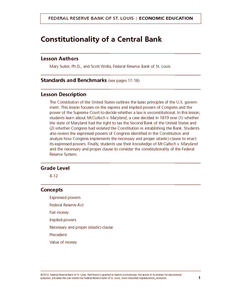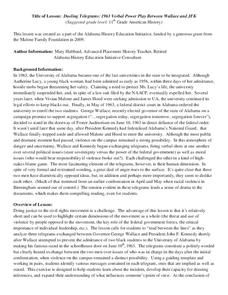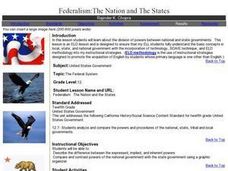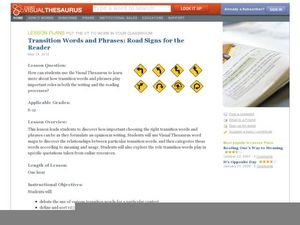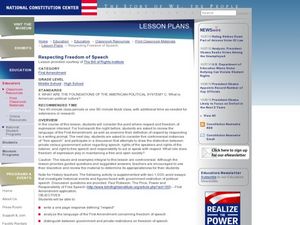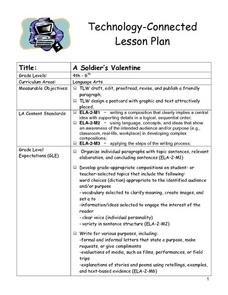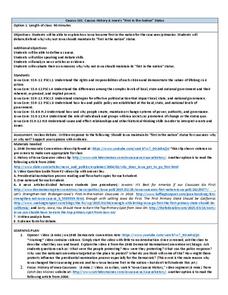C-SPAN
Choice Board: Expressed and Implied Powers
Article 1, Section 8 of the United States Constitution expressly lists powers given to Congress. Over the years, lawmakers have expanded the enumerated powers to include powers implied by the list. To better understand the significance...
Heritage Foundation
Congress's Territorial Powers, Implied Powers, Citizenship, and the Bureaucracy
An informative resource gives scholars a look into why the US Constitution placed certain federal powers over that of the state. A variety of activities about constitutional clauses helps to create meaningful learning.
Federal Reserve Bank
Constitutionality of a Central Bank
Considering the expressed and implied powers of Congress, was it constitutional for the United States to establish the Second National Bank in the early nineteenth century? What is the constitutionality of the Federal Reserve System?
iCivics
The "Federal" in Federalism
How are states in the United States related to each other? Does the government bind them together? Do states have different governments? After reading about federal power as a whole group, your class members will participate in a...
Alabama Department of Archives and History
Dueling Telegrams: 1963 Verbal Power Play Between Wallace and JFK
Information, inferences, and innuendos. Text and subtext. Class members examine telegrams exchanged between President John F. Kennedy and Alabama Governor George Wallace, studying both what is stated and what is implied by the diction...
State Bar of Texas
McCullough v. Maryland
Can a state government tax the federal government? The Supreme Court case McCullough v. Maryland explores different governments in the United States. Scholars research the court's decision with a video and discussion. They formulate...
Curated OER
Federalism: The Nation and The States
Twelfth graders discuss the division of powers between national and state governments. Groups create a PowerPoint slide representing one of the 3 types of powers.
Curated OER
Introduction to the Constitution (Enumerated Powers)
Students continue their examination of the United States Constitution. Using the text, they discover where the power for the government came from and why it was needed. They are introduced to the concept of Federalism and discuss the...
Curated OER
Battery Power
Sixth graders examine batteries as a source of power. They study the cost and environmental impact of using regular vs. rechargeable batteries.
Ontario
Critical Literacy—Media Texts
Media texts convey both overt and implied messages. As part of their study of media, class members analyze the language, form, techniques, and aesthetics in a variety of media texts.
Prestwick House
Connotative vs. Denotative Meanings
Besides the dictionary definition, words also carry the added weight of meanings that are inferred or implied, meanings conferred on words, or connotations. To gain an understanding the importance of connotation, class members engage in...
Curated OER
The Power of Words
Students research the power of words and the necessary teaching of tolerance. In groups, they research a particular word given to them about a group in society. They trace the origin of the word and form a stance on how they view the...
Curated OER
Transition Words and Phrases: Road Signs for the Reader
Therefore! However! Furthermore! Explore the power of transition words and phrases. Signal your readers by suggesting the relationship between different thoughts or points. Help them demonstrate an understanding of word relationships.
Curated OER
Lesson One: "Full Court Press"
Students watch video clip about high school basketball hero who bullied some students, and was killed as result of his bullying. Students then describe and discuss impact of bullying in schools, determine who in the community has power...
Curated OER
Respecting Freedom of Speech
Students analyze the First Amendment. In this Bill of Rights lesson, students listen to their instructor present a lecture regarding the facets of the First Amendment. Students examine cases which pertain to the freedoms that the...
Curated OER
Popular Sovereignty Under the Kansas-Nebraska Act
Seventh graders examine the implications of the Kansas-Nebraska Act. In this slavery lesson, 7th graders examine a map of 1820 America and discuss the balance of power implied by the map. Students then read Stephen Douglas's speech on...
Curated OER
Art and Power
Pupils study the complex relationships between art, artists, and the political establishment in the 19th and 20th centuries. In this art and history lesson, students study various photos, paintings, and sculptures and learn about the...
Curated OER
Teaching With Documents: Powers of Persuasion - Poster Art of World War II
Students analyze 11 posters from wartime and complete a worksheet. They discuss the similarities and differences between the posters and where the posters might have been posted. Student volunteers from each group present the posters to...
Curated OER
Playing By Different Rules
Students explore the concept of American imperialism by researching and analyzing historical examples of American imperialism. They draft a set of laws that would govern the actions of powerful nations in other countries.
Curated OER
Darwin, Politics, and Religion
Students gain an understanding of the Darwinian theory of evolution, examine how Darwin's theory has been adopted by ruling elites in order to justify their position in power, compare religious and historical responses to Darwin's...
Curated OER
The Language of Deception
Learners explore informative, expressive, directive and performative languages and discuss examples of each. In groups, students research the types of languages, their effectiveness in communicating truth, needs and desires. Learners...
Curated OER
A Soldier's Valentine
Students create Valentine's for soldiers in Iraq. They review how to write a friendly paragraph and discuss the military and duties of soldiers in Iraq. They create postcards and write reasons why they are rpoud of the military and how...
Curated OER
A Lesson To Accompany "The First Bank of the United States: A Chapter in the History of Central Banking"
Here is an interesting topic. Learners examine the economics that led to the founding of the First Bank of America. They participate in a reader's theater experience depicting the debate between Alexander Hamilton and Thomas Jefferson...
Caucus 101
Caucus History and Iowa’s “First in the Nation” Status
What is a caucus? Why is Iowa's first? Why did Iowa shift to the caucus format? After researching these basic questions, class members debate the question of whether or not Iowa should maintain its "first in the nation" status for caucuses.
Other popular searches
- Implied Powers of Congress
- Delegated and Implied Powers
- Definition of Implied Powers
- Enumerated or Implied Powers
- Defintion of Implied Powers
- Implied Powers Congress




